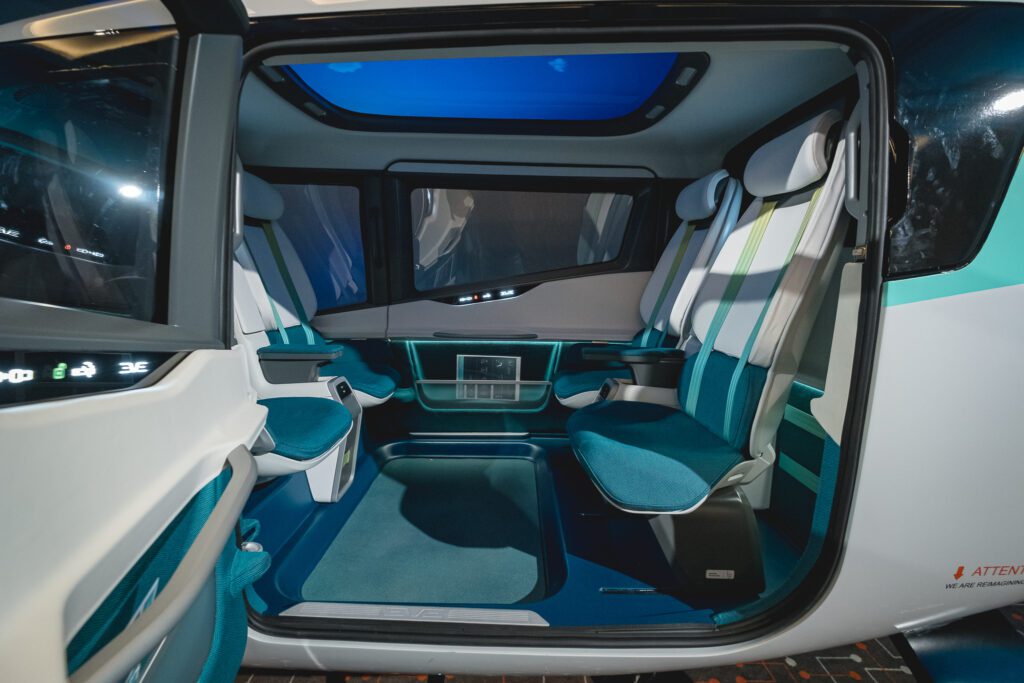
Eve revealed the full-sized mock-up of their eVTOL aircraft’s cabin at the Farnborough Airshow this week. (Photo, courtesy of Embraer and Eve)
Eve Holdings revealed a full-sized mock-up of the cabin of its electric vertical take-off and landing (eVTOL) aircraft for the first time at the Farnborough Airshow. In another announcement at the airshow this week, Eve disclosed the signing of a Letter of Intent with Embraer and BAE Systems that includes a potential order of 150 of Eve’s eVTOLs. BAE Systems and Embraer also signed a Memorandum of Understanding this week indicating a possible collaboration to develop a variation of Eve’s eVTOL for defense applications.
Eve is a subsidiary of Embraer, previously known as Eve Urban Air Mobility. The subsidiary formed a business combination with Zanite Acquisition Corp. in May of this year, and began trading on the New York Stock Exchange at that time.
Flavia Ciaccia, Vice President of User Experience of Eve, commented on the unveiling of the eVTOL aircraft’s cabin: “This mock-up brilliantly materialises the cabin concept we have been co-creating with potential users for years. We recently received feedback from our advisory board. […] Our solutions were designed considering essential market needs, such as accessibility, safety, sustainability, and ticket price.”

The current design of Eve’s aircraft includes a conventional wing and tail. This differs from the vehicle’s previous canard configuration. (Photo: Eve)
The current design of Eve’s aircraft includes a conventional wing and tail. This differs from the vehicle’s previous canard configuration. The company’s co-CEO, Andre Stein, remarked that Eve has been “accelerating our resources engagement and evolving the project’s maturity.”
Stein noted the potential of Eve’s eVTOL to be adapted for applications such as humanitarian response and disaster relief. The Letter of Intent (LOI) signed with Embraer and BAE Systems is non-binding, and the two companies intend to evaluate the application of the eVTOL for defense and security missions. President and CEO of Embraer Defense & Security, Jackson Schneider, noted that a defense variant of Eve’s aircraft could be a sustainable and cost-effective vehicle that offers adaptable capability.
Ian Muldowney, BAE Systems Air Chief Operating Officer, also commented on the announcement about the LOI with Eve. Muldowney shared that the operating environment of their customers is increasing in complexity. “eVTOL is just one example of how we’re looking at emerging technologies, including those from the commercial market. We are exploring how we can adapt these solutions to bring vital operational capability to our customers quickly and at a lower cost.”
This week, Eve also selected Halo Aviation as the launch customer for its Urban Air Traffic Management (UATM) software solution. Halo provides custom private travel services for the urban air mobility (UAM) market. Halo and Eve entered into a LOI in which Halo will acquire Eve’s UATM software and collaborate in the development and optimization of UAM operations.
Eve and Halo intend to develop an operational model, which would be deployed in the U.S. and the U.K. for specific missions.
Andrew Collins, Halo’s President and CEO, described the agreement as a unique and collaborative partnership. He stated that their team looks forward to working with Eve because the company is working to deploy a series of agnostic solutions to drive UAM, rather than solely focusing on manufacturing their eVTOL aircraft.

“We’ve been accelerating our resources engagement and evolving the project’s maturity.” co-CEO of Eve, Andre Stein (Photo: Eve)
Eve’s Andre Stein remarked on the LOI with Halo, saying, “We believe that collaborations such as ours are vital to fostering a thriving UAM market. […] Eve’s agnostic portfolio of solutions addresses the complexity of UAM networks, which require holistic and integrated services across the ecosystem that connect stakeholders to maintain and improve safety, optimise performance, and reduce operating costs. Halo’s outstanding travel services, coupled with our solutions, make this partnership extremely promising.”
In March, Eve announced the formation of two new partnerships. Global Crossing Airlines Group signed an LOI with Eve to order as many as 200 eVTOL aircraft. The companies expect to collaborate further in exploration of UAM ecosystem development and supporting infrastructure for eVTOL operations. A week later, Eve and Acciona, a renewable energy solutions developer, entered into a strategic partnership. Acciona plans to invest $30 million into Eve as part of the partnership.
Additionally, Eve have also recently been exploring the potential of autonomous flight. The companies collaborated with Iris Automation, Near Earth Autonomy, and Daedalean to conduct experimental flights that tested new technologies for autonomous systems. Key functions being evaluated were visual traffic detection, visual positioning, and visual landing functions.